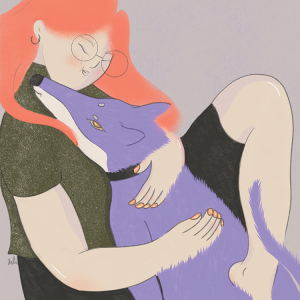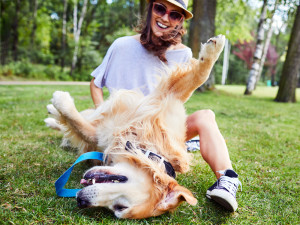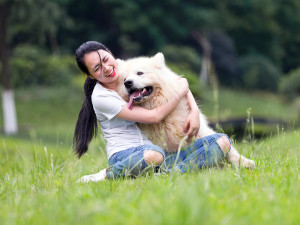A New Study Compares Dog and Cat People—One Group Is Clearly More Neurotic
And the other is much more resilient.

Share Article
“Are you a dog person or a cat person?” This very question tells us what we think we need to know about someone else within seconds (or so we think). Actually, there turns out to be some truth to that. Researchers Jessica Oliva Baines and Leah Michelle Baines did a studyopens in a new tab, published in the multidisciplinary journal Anthrozoös last year that proves there is something to this “us verses them” theory.
Oliva and co-author Leah Michelle Baines surveyed 329 participants, to see if dog parents and cat parents displayed different levels of resilience, openness to experience, conscientiousness, extraversion, agreeableness, and neuroticism. “We also wanted to compare non-owners,” Oliva tells Kinship. “But our sample of non-owners was too small to make this comparison, so we just stuck to [owners of] cats [versus] dogs.”

Get (totally free) deals for food, treats, accessories, tech, and way more pet parenting must-haves.
opens in a new tabPast scholarship already indicates that cat people tend to score higher for neuroticism, for example, so Oliva and Baines expected to repeat that result. In the end, they were right: Cat parents did score higher than dog parents on the neuroticism chart. Before you get offended, cat parents, please read on for context.
Cat people tend to be neurotic, or so the research says.
Their study cites research from 1980 that compared personality traitsopens in a new tab of different pet parents. Over the years, some scholars have echoed one another’s findings. While conducting research for his 2000 bookopens in a new tab, Why We Love Dogs the Way We Do, psychology professor and dog expert Stanley Coren surveyed 6,149 people to compare personalities of dog parents, cat parents, and folks who live without pets. Ultimately, he found that opens in a new tabrespondents who lived with dogs were more extroverted and accepting, while those with cats for roommates tended to be more introverted and less agreeable.
Ten years after Coren’s book debuted, Sam Gosling, a University of Texas at Austin psychologist, conducted his own survey of 4,565 volunteers using his own questions and observed similar resultsopens in a new tab. (Forty-six percent of Gosling’s respondents described themselves as “dog people,” while 12 percent called themselves “cat people”; 28 percent identified as “both” and 15 percent as “neither.”)
In Gosling’s study, dog parents scored higher than cat parents for extraversion, agreeableness, and conscientiousness. Meanwhile, cat people came out on top for both openness and neuroticism — hey, having a balanced personality is healthy.
Dog people are more resilient.
All of this started with — not a shock — a different study. A few years ago, during COVID-19 lockdown, Oliva wanted to find out how living with a pet impacted loneliness. Multiple studies later, the James Cook University psychology researcher has found statistically significant reason to believe that dog people tend to be more resilient than cat people. The reason for this link, however, remains a bit of a mystery.
Oliva’s 2020 studyopens in a new tab (about loneliness), co-authored with Kim Louise Johnston, found that dog people who lived alone were less lonely than others who lived alone without a dog — whether they had other, non-canine pets or not. “Frequency of pet interactions did not explain these findings,” Oliva says. “So, we assumed that the dogs were acting as a kind of ‘social catalyst.’”
As someone who first adopted a dog in the hopes of spending more time outside, this logic seems sound to me. But that actually doesn’t jive with Oliva’s subsequent research. When Oliva and Johnston investigated the relationship between dog walkingopens in a new tab and loneliness, they found no significant link.
“So, then we started to think that maybe there was something inherent about being someone that likes to own dogs that also makes them more resilient to stressful situations, like prolonged social isolation,” she says. “Which gave us the idea to compare personality profiles of dog owners, cat owners, and non-owners [in the 2024 study].”
Which came first: a resilient pet parent, or a calm-inducing dog?
Oliva and Baines’s results seem to fall in line with prior research, but the scholars also acknowledge that their data set comes with one major limitation. Because they surveyed their subjects only once, as opposed to on multiple occasions over time, “it is not possible to know which comes first, the owner’s personality or the pet.”
In other words, Oliva and Baines ran into a bit of a “the chicken or the egg” scenario. Do people who choose dogs as pets tend to be more stable during periods of stress, or does living with dogs make pet parents more resilient over time? To find that out, we’d need more research — specifically, a longitudinal study (aka a study that observes the same variables as time passes).
For now, that’ll have to wait. Oliva is already hard at work on a different long-term study in partnership with the Royal Society for the Prevention of Cruelty to Animalsopens in a new tab, “looking at how the bond between owners of dogs and cats develops over the first year post adoption.”
Oliva will check in with subjects who have recently adopted pets at the three-month, six-month, and one-year marks to examine how their mental health changes over time, as indicated by depression, stress, and anxiety scores. She plans to publish the results next year.
References
Baines, Leah Michelle, and Jessica Lee Oliva. “Unleashing the Personality Divide: Resilience in Dog Owners, Neuroticism in Cat Owners.” Anthrozoös, 29 July 2024, pp. 1–16, https://doi.org/10.1080/08927936.2024.2378592opens in a new tab.
Oliva, Jessica Lee, and Kim Louise Johnston. “Puppy Love in the Time of Corona: Dog Ownership Protects against Loneliness for Those Living Alone during the COVID-19 Lockdown.” International Journal of Social Psychiatry, vol. 67, no. 3, 23 July 2020, p. 002076402094419, journals.sagepub.com/doi/full/10.1177/0020764020944195, https://doi.org/10.1177/0020764020944195opens in a new tab.

Laura Bradley
Laura is a New York-based experienced writer and mom of two rescue pups. When she is not writing or walking the pooches, you will probably find her in the community garden.
Related articles
![Man hugging his fluffy white dog happily]() opens in a new tab
opens in a new tabChemistry Between People and Dogs Is Real (It’s Science)
How the “love hormone” oxytocin connects us with our pups.
![Illustration of a woman hugging a dog]() opens in a new tab
opens in a new tabYour Dog Can Smell When You’re Stressed, New Study Says
Research finds that your pup can smell when you’ve been doom-scrolling, and they get bummed out.
![woman playing with her dog in the park]() opens in a new tab
opens in a new tabWhy Your Dog Should Be Your Go-To Stress Buster
You need a break sometimes, and your dog is ready (and willing!) to take one with you.
![Woman and her large white dog sit in grass outside.]() opens in a new tab
opens in a new tabPlaying with Dogs Reduces Stress and Increases Concentration, New Study Finds
Having trouble chilling out or focusing? Maybe it’s time to get a dog.
![dog looking up at person on laptop]() opens in a new tab
opens in a new tabYes, Your Stress Is Making Your Dog Stressed, New Study Finds
It might be time to take a deep breath for both of your sake.






